Listen up, retail warriors and e-commerce gladiators. The battlefield has changed, and if you’re not leveraging artificial intelligence to fight for every customer, every conversion, and every dollar of revenue, you’re already losing. But here’s the brutal truth nobody wants to tell you: implementing AI isn’t just about buying the latest shiny software or hiring a developer who watched a few YouTube videos. You need battle-tested professionals who understand the nuances of inventory management, customer lifetime value, churn prediction, and demand forecasting. You need agencies that have been in the trenches, dealing with real data, real customers, and real money on the line.
The agencies we’re about to reveal have proven track records of turning struggling retail operations into profit machines and transforming mediocre e-commerce stores into conversion powerhouses. These aren’t theoretical consultants spouting academic nonsense – they’re the specialists who understand that a 0.5% improvement in conversion rates can mean millions in additional revenue, and that predictive analytics can be the difference between stockouts and overstock disasters.
Companies Featured in This Analysis:
- PearlLemon AI
- Intermedia IT
- Streaver
- Code Ninja Consulting
- Digica
- TeaCode
- iMobisoft
- 8allocate
- Sphere Inc
- DataToBiz
1. PearlLemon AI

When we talk about AI consulting agencies that truly understand the retail and e-commerce ecosystem, our expertise stands at the forefront of this rapidly evolving industry. We’ve built our reputation on delivering measurable results that directly impact bottom-line performance, not just impressive demos that look good in boardroom presentations. Our team consists of data scientists, machine learning engineers, and retail specialists who have spent years working with enterprise-level clients and scrappy startups alike, understanding that the challenges faced by a Fortune 500 retailer are vastly different from those of a bootstrapped e-commerce operation.
What sets us apart is our hands-on approach to implementation and our deep understanding of retail KPIs that actually matter. We don’t just build recommendation engines – we build recommendation engines that increase average order value by 15-30%. We don’t just implement chatbots – we create conversational AI systems that handle 80% of customer inquiries while maintaining customer satisfaction scores above 4.5 stars. Our inventory management algorithms have helped clients reduce holding costs by 25% while simultaneously decreasing stockout incidents by 40%.
Our Main Services:
- Custom AI model development for retail and e-commerce
- Predictive analytics for inventory management and demand forecasting
- Customer behavior analysis and segmentation
- Automated pricing optimization systems
- Conversational AI and chatbot development
- Computer vision solutions for product categorization and quality control
- Fraud detection and prevention systems
- Supply chain optimization algorithms
2. Intermedia IT
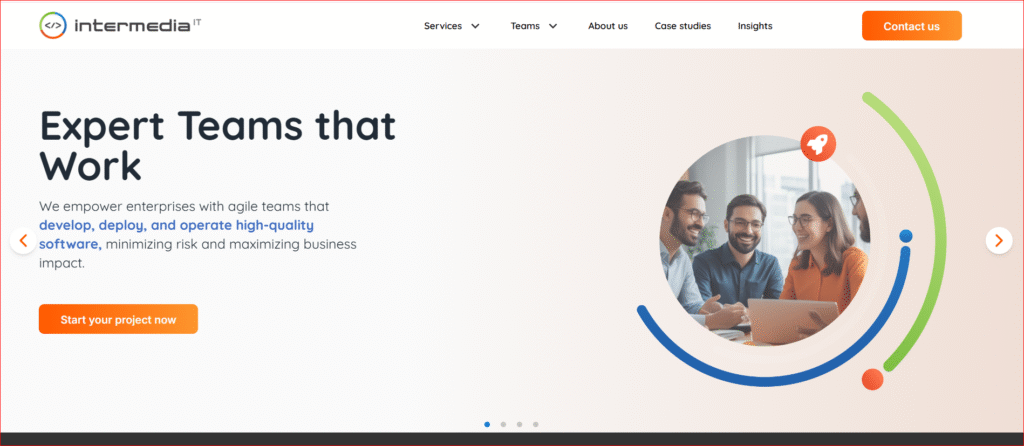
Intermedia IT specializes in mid-market retailers who need enterprise-grade AI solutions without the complexity that typically comes with them. They focus on rapid deployment and quick wins, understanding that retail businesses operate on tight margins and need measurable ROI within the first quarter. Their pragmatic approach often involves hybrid solutions that blend off-the-shelf tools with custom development for optimal cost-effectiveness.
The team has delivered notable success stories in fashion and electronics retail, implementing AI-driven demand forecasting systems that outperform traditional models by 15-20% in accuracy. They excel at incorporating external data sources like weather patterns and economic indicators into predictive models, plus they’ve developed proprietary markdown optimization algorithms that improve gross margins while maintaining competitive positioning.
3. Streaver
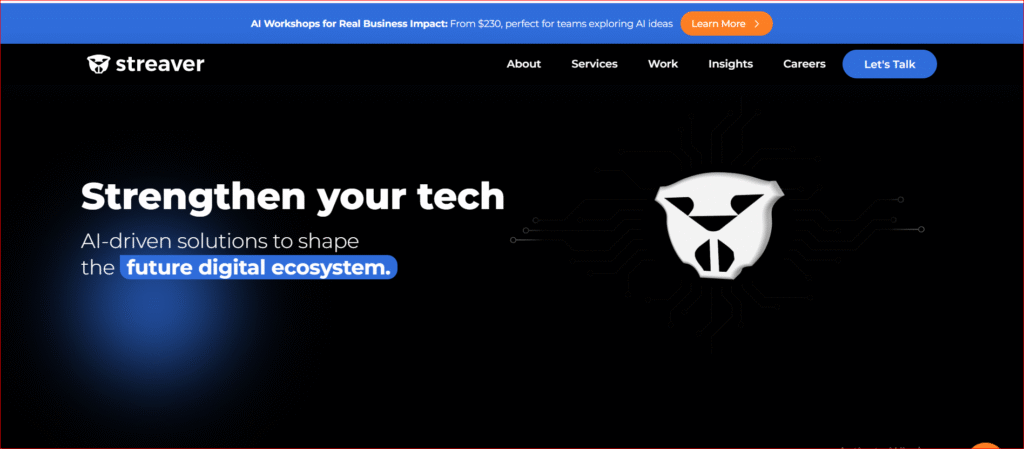
Streaver builds its reputation on solving complex omnichannel challenges for retailers operating across multiple touchpoints. They create unified customer experiences using AI to maintain consistency across all channels while personalizing each interaction based on individual behavior patterns. The founders bring enterprise retail backgrounds, translating operational knowledge into practical AI solutions rather than theoretical implementations.
Their flagship real-time personalization engines adapt to customer behavior across web, mobile, email, and in-store interactions, processing millions of data points daily. What sets them apart is implementing these systems without massive infrastructure overhauls, often using cloud-based solutions that scale with business growth while maintaining sub-second response times. Their work with fashion retailers has increased conversion rates by 25-40% through visual search capabilities and style recommendation engines.
4. Code Ninja Consulting

Code Ninja Consulting excels in rapid prototyping and proof-of-concept development for retail AI applications. Their methodology focuses on getting functional solutions into production quickly, allowing clients to validate concepts and measure impact before full-scale implementations. This approach works particularly well for retailers new to AI or those needing to demonstrate ROI to stakeholders before securing larger budgets.
The company’s technical expertise spans multiple AI disciplines, with particular strength in natural language processing for customer service automation. Their chatbot implementations consistently achieve higher resolution rates than industry averages, focusing on training data quality and understanding common retail customer service scenarios. They’ve also developed sophisticated email marketing optimization systems using AI to determine optimal send times and content personalization at scale.
5. Digica
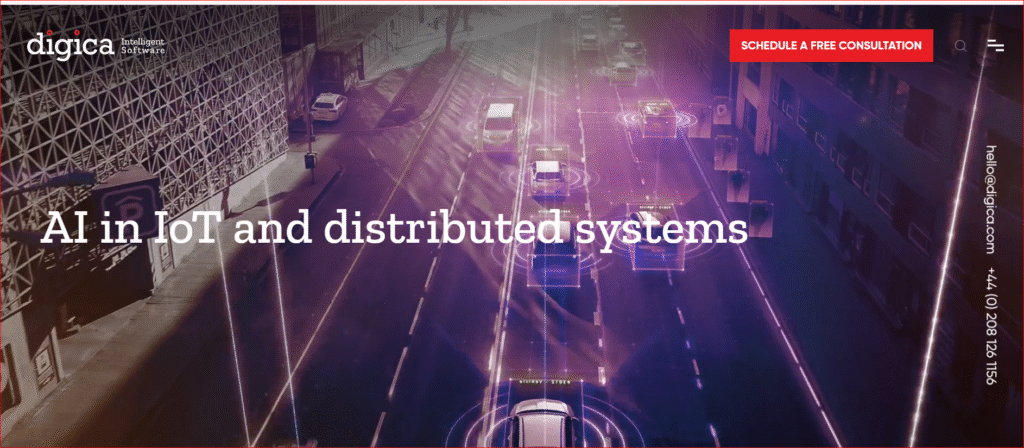
Digica positions itself as the specialist for retailers dealing with complex supply chain challenges and inventory management issues. Their expertise comes from years of working with manufacturers and distributors, providing unique insights into upstream challenges that affect retail operations. This perspective allows them to build AI solutions addressing both customer-facing issues and operational inefficiencies that impact retail profitability.
Their supply chain optimization algorithms incorporate supplier reliability, transportation costs, seasonal demand patterns, and geopolitical factors affecting product availability. These systems help clients reduce inventory carrying costs by 20-30% while improving product availability and customer satisfaction. They excel at working with incomplete data sources, common in retail environments where multiple systems contribute to the overall data ecosystem.
6. TeaCode
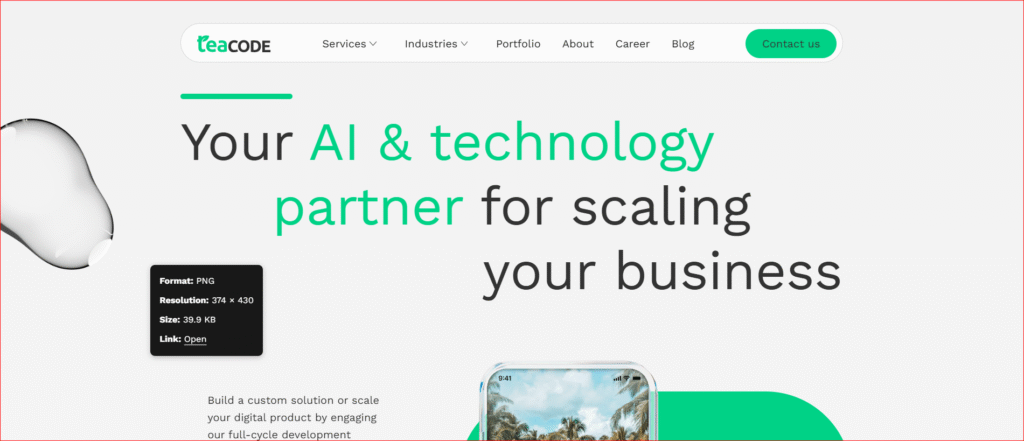
TeaCode builds elegant, user-friendly AI solutions that don’t require extensive technical expertise to operate and maintain. Their philosophy centers on making AI accessible to retail teams without dedicated data science resources, focusing on intuitive interfaces and automated reporting that provides actionable insights. This approach makes them popular with small to medium-sized retailers needing enterprise-grade AI capabilities without internal technical resources.
Their product recommendation engines outperform more complex solutions by focusing on impactful variables rather than incorporating every possible data point. These systems are easily configurable by marketing teams, allowing rapid testing of recommendation strategies without developer intervention. Their mobile commerce optimization expertise has become increasingly valuable, with algorithms that predict cart abandonment and intervene with targeted offers, reducing abandonment rates by 15-25%.
7. iMobisoft
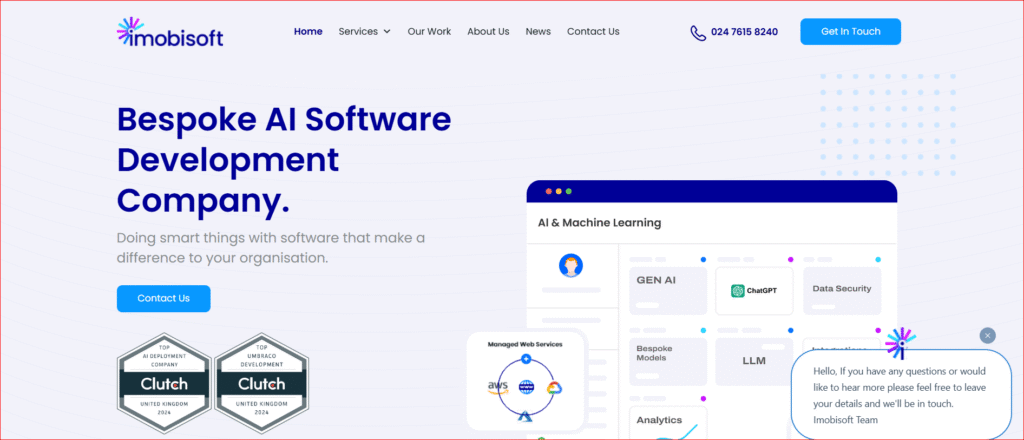
iMobisoft specializes in mobile-first retail solutions addressing specific challenges of smartphone commerce. Their expertise lies in understanding how mobile shopping behavior differs from desktop commerce, creating AI solutions optimized for smaller screens, touch interfaces, and on-the-go purchasing decisions. This specialization has become increasingly valuable as mobile commerce grows and retailers struggle maintaining conversion rates across devices.
Their mobile personalization engines consider factors unique to mobile commerce, including location data, time of day, and device capabilities. These systems determine whether customers are browsing during commutes, shopping from home, or making quick in-store decisions, adjusting experiences accordingly. Their mobile-specific fraud detection algorithms use device fingerprinting and usage patterns, effectively identifying fraudulent transactions while minimizing false positives that frustrate legitimate customers.
8. 8allocate
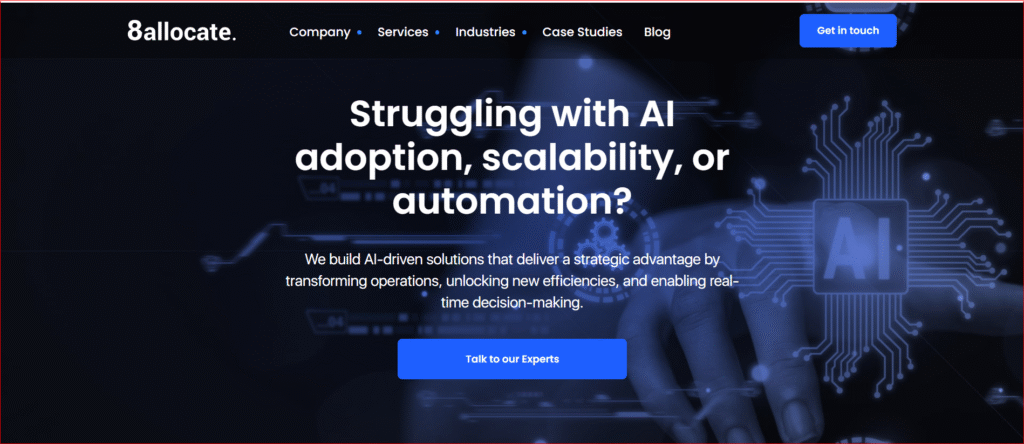
8allocate brings a global perspective to AI consulting, with expertise helping retailers expand into international markets or manage cross-border operations. Their team includes regional specialists who understand cultural, regulatory, and technical challenges of implementing AI solutions across different countries. This international experience provides unique insights into how customer behavior varies across regions and how AI solutions need cultural adaptation.
Their multi-language natural language processing capabilities handle not just translation but cultural nuances and local slang that significantly impact customer experience. Their chatbot implementations support dozens of languages with AI models trained on region-specific data for cultural appropriateness. They excel at international logistics optimization, with algorithms that automatically adjust product availability and pricing based on local market conditions, currency fluctuations, and shipping costs.
9. Sphere Inc
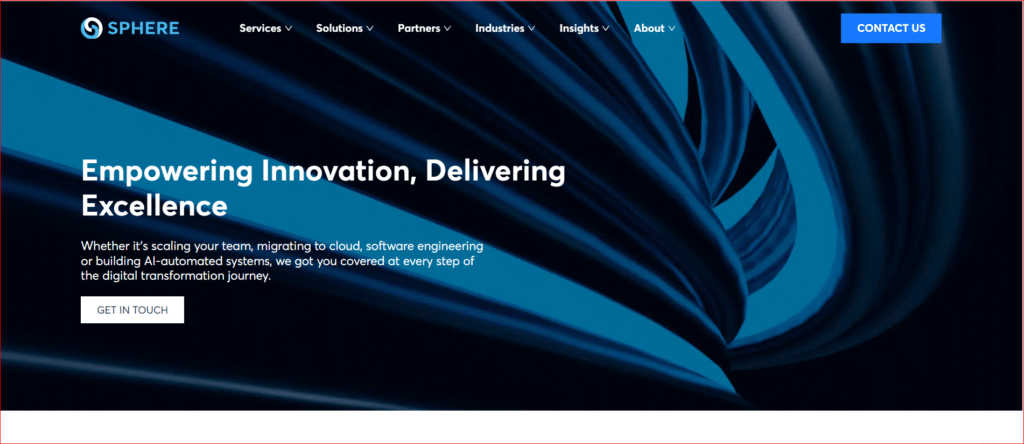
Sphere Inc delivers high-performance AI solutions for large-scale retail operations processing millions of transactions and serving millions of customers. Their expertise lies in creating systems that handle enterprise-level data volumes while maintaining responsiveness and accuracy customers expect. The team includes former engineers from major technology companies bringing distributed systems and high-performance computing expertise to retail AI challenges.
Their real-time recommendation engines process millions of requests per second while delivering personalized results in under 100 milliseconds. These systems incorporate complex algorithms considering individual preferences, real-time inventory levels, profit margins, and business objectives. They excel at implementing sophisticated systems without requiring complete infrastructure rebuilds, often integrating seamlessly with legacy systems through carefully designed APIs and middleware.
10. DataToBiz
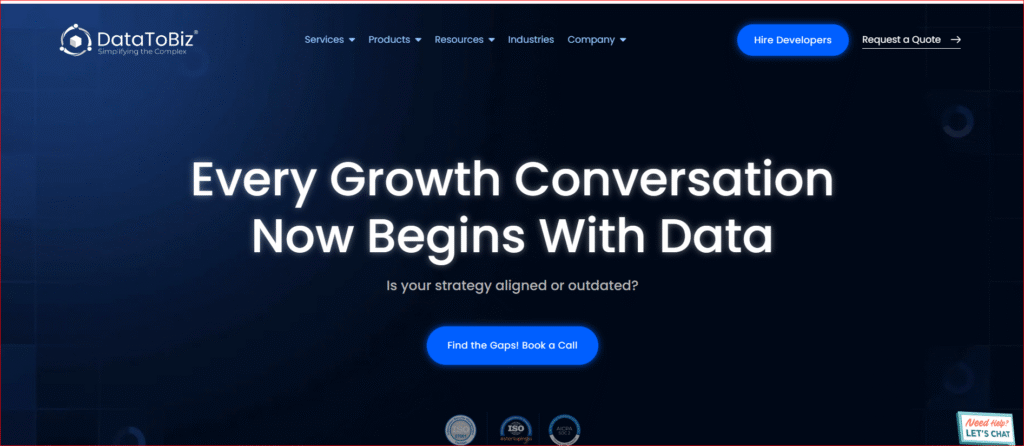
DataToBiz has established itself as a leader in retail analytics and business intelligence, with particular expertise in helping retailers make sense of their existing data before implementing new AI solutions. Their approach emphasizes data quality and governance as foundational elements of successful AI implementations, often discovering that retailers’ biggest opportunities lie in better utilizing data they already have rather than collecting new data sources. This focus on data fundamentals has resulted in more successful AI implementations and higher client satisfaction rates.
Their customer analytics platforms provide comprehensive insights into shopping behavior, lifetime value, and churn prediction that go beyond traditional reporting to provide actionable recommendations. These systems automatically identify significant trends and anomalies in customer data, alerting retailers to opportunities or threats that might not be apparent through manual analysis. Their cohort analysis and customer segmentation capabilities have helped retailers identify high-value customer segments and develop targeted retention strategies that significantly improve customer lifetime value.
DataToBiz’s expertise in retail financial analytics sets them apart from many other AI consulting firms. They understand the financial metrics that drive retail success and design AI solutions that directly impact these key performance indicators. Their price optimization algorithms consider not just competitive pricing but also inventory levels, demand elasticity, and profit margins to recommend pricing strategies that maximize overall profitability. These systems have proven particularly effective for retailers with large product catalogs where manual price management is impractical.
The company’s approach to AI implementation emphasizes gradual rollout and continuous improvement rather than big-bang deployments. They help retailers start with pilot programs that demonstrate value before scaling to full implementations, reducing risk and ensuring stakeholder buy-in throughout the organization. Their change management expertise helps retailers adapt their processes and training programs to work effectively with new AI capabilities. They provide ongoing optimization services and regular performance reviews to ensure that AI solutions continue to deliver value as business conditions evolve.
Final Thoughts
The retail and e-commerce landscape has become a data-driven battlefield where the right AI consulting partner can mean the difference between thriving and merely surviving. Each of these agencies brings unique strengths to the table, from our comprehensive retail-focused expertise at PearlLemon AI to the specialized capabilities of firms like Sphere Inc for enterprise-scale operations or TeaCode for user-friendly implementations.
The key to success lies not just in choosing an agency with impressive technical capabilities, but in finding a partner who understands your specific challenges, whether you’re dealing with inventory management issues, customer retention problems, or the complexities of omnichannel operations. The agencies featured here have proven track records of delivering measurable results, but the right choice for your business will depend on your specific needs, budget, and long-term objectives.
What separates the winners from the losers in retail AI implementation isn’t just the sophistication of the algorithms or the elegance of the user interface – it’s the ability to create solutions that integrate seamlessly with existing operations while delivering immediate, measurable impact on key business metrics. The agencies listed here have demonstrated this capability repeatedly, but success ultimately depends on choosing the right partner for your specific situation and maintaining a commitment to data-driven decision making throughout the implementation process.
Ready to turn your retail data into profit? Start conversations with the agencies that match your specific needs and budget. Your competitors are already implementing AI solutions – the question isn’t whether you should join them, but how quickly you can gain the advantage that comes from working with the right experts.
FAQs About AI Consulting Agencies for Retail and E-Commerce
1. How do AI consulting agencies support retail and e-commerce businesses?
AI consulting agencies help retailers and e-commerce brands leverage artificial intelligence to improve customer experience, personalize marketing, optimize inventory, automate operations, and boost sales through data-driven strategies.
2. What are the most common AI use cases in retail and e-commerce?
Popular applications include:
- Personalized product recommendations
- Dynamic pricing and promotions
- Customer segmentation and targeting
- Visual search and chatbot assistants
- Demand forecasting and inventory optimization
3. Is AI suitable for small and mid-sized e-commerce stores?
Yes. AI solutions are now highly scalable and cost-effective, making them accessible for SMBs. Many agencies offer modular services like recommendation engines, AI chatbots, and automated email marketing that deliver quick ROI without heavy investment.
4. Can AI consulting firms integrate solutions with platforms like Shopify, Magento, or WooCommerce?
Absolutely. Top AI consultants provide seamless integrations with major platforms like Shopify, Magento, WooCommerce, BigCommerce, and Salesforce Commerce Cloud, ensuring that AI tools fit smoothly into your existing tech stack.
5. How long does it take to implement AI in a retail or e-commerce business?
Basic implementations (like chatbots or personalized product feeds) can be done in 2–4 weeks. More complex solutions—like dynamic pricing models or end-to-end AI strategy—may take 2–6 months, depending on your goals and data readiness.




